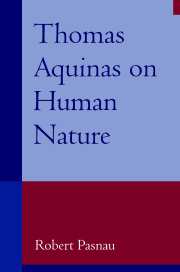Book contents
- Frontmatter
- Contents
- List of Abbreviations
- Acknowledgments
- A Note to the Reader
- Introduction
- PART I ESSENTIAL FEATURES (QQ75–76)
- PART II CAPACITIES (QQ77–83)
- PART III FUNCTIONS (QQ84–89)
- 9 Mind and image
- 10 Mind and reality
- 11 Knowing the mind
- 12 Life after death
- Epilogue: Why Did God Make Me?
- Notes
- Bibliography
- Appendix: Outline of the Treatise (ST 1a 75–89)
- Index
11 - Knowing the mind
Published online by Cambridge University Press: 05 June 2012
- Frontmatter
- Contents
- List of Abbreviations
- Acknowledgments
- A Note to the Reader
- Introduction
- PART I ESSENTIAL FEATURES (QQ75–76)
- PART II CAPACITIES (QQ77–83)
- PART III FUNCTIONS (QQ84–89)
- 9 Mind and image
- 10 Mind and reality
- 11 Knowing the mind
- 12 Life after death
- Epilogue: Why Did God Make Me?
- Notes
- Bibliography
- Appendix: Outline of the Treatise (ST 1a 75–89)
- Index
Summary
καì αὐτòς δε νoητóς ἐστιν ὥσπερ τὰ νoητά
(De an. III 4, 430a2–3; see p. 336)Aquinas offers a sophisticated and rewarding account of how we know our own minds. Although he denies that the mind has direct access to its own nature (§11.1), he believes that through indirect methods the mind can understand itself. The reflective method he proposes is interesting because it opposes the introspective model, but at the same time accounts for the special access we so clearly do have to our own minds (§11.2). In advancing a theory of this form, Aquinas defends an approach that falls in between the two extremes of direct introspection and behaviorism. This moderate approach accounts for why it is so hard for us to understand the mind (§11.3). Moreover, the approach can be extended into a general explanation of how we understand other minds (§11.4).
The inscrutable self
Aquinas devotes QQ84–86 to our knowledge of the external, material world; in Q87 he turns to our knowledge of our own minds. The former series of questions had begun by asking whether the mind does in fact have knowledge of external, material things. Aquinas concluded that we do have such knowledge, in a certain way: “Therefore, it must be said that the soul, through intellect, cognizes bodies by means of a cognition that is immaterial, universal, and necessary” (84.1c; §10.1). In Q87 there is no parallel article devoted to the fundamental question of whether the mind has self-knowledge. Aquinas simply takes such knowledge for granted: his idea, presumably, is that the previous twelve questions (QQ75–86) make the best case he knows how to make for the mind's ability to understand itself.
- Type
- Chapter
- Information
- Thomas Aquinas on Human NatureA Philosophical Study of Summa Theologiae, 1a 75-89, pp. 330 - 360Publisher: Cambridge University PressPrint publication year: 2001



